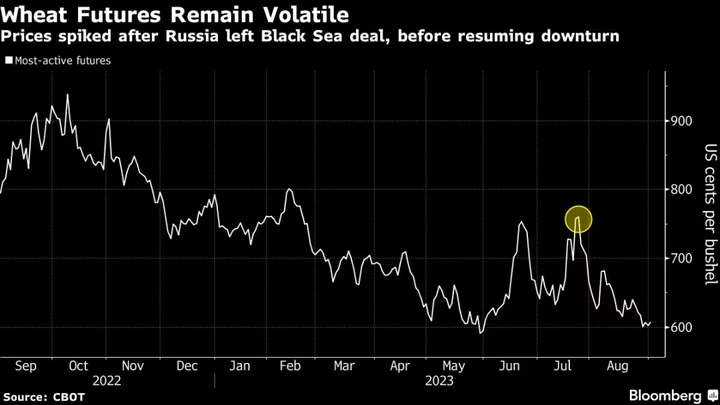Turkish President Recep Tayyip Erdogan will seek to persuade Vladimir Putin on Monday to revive a UN-backed deal that would allow the export of Ukrainian grain from the Black Sea and ease concerns over global food supplies.
Erdogan is due to meet Putin in the Russian resort town of Sochi, hoping to come away with a new framework for negotiations that he can present to global leaders at the G-20 Summit in India later in the week. But a barrage of Russian drone strikes on Ukrainian port facilities set a somber tone on the eve of talks.
Uncertainty about the future of supplies from one of the world’s largest grain exporters, has contributed to weeks of volatility in global wheat prices, as has the surge in hostilities in and around the Black Sea.
A mid-sized power that’s maintained strong ties with both Putin and the West, Turkey helped broker the original Black Sea Grain Initiative in July 2022, allowing Ukrainian cargoes to return to global markets upended by Russia’s invasion and subsequent disruptions to one of the world’s major crop shipping channels.
But the arrangement, a rare diplomatic success in an otherwise grinding war, was fragile from the outset and Ukraine’s grain exports were repeatedly disrupted by slow ship inspections and political tensions.
Russia exited the agreement and closed the safe corridor in July, complaining that its own demands for better trade terms had been ignored.
Read more:
What End of Ukraine Grain Export Deal Means for World: QuickTake
As Ukraine Grain Deadline Approaches, Pact Is Already Broken
Russia Is Tightening its Grip on the World’s Wheat Supply
Russian missiles have repeatedly targeted Ukrainian grain export infrastructure while Ukrainian drones crippled a Russian naval vessel and an oil tanker, putting its Black Sea exports at risk for the first time.
Russia launched waves of Shahed loitering drones in the leadup to the talks, aimed at facilities in Ukraine’s southern Odesa region.
Ukraine’s president spoke with French President Emmanuel Macron on Sunday, including about “ways to ensure the functioning of the grain corridor and enhance the security of the Odesa region,” Volodymyr Zelenskiy said on X, formerly Twitter.
That’s raised the stakes for Erdogan’s latest diplomatic effort, one further complicated by the practicalities of US and European sanctions.
Russian Demands
Russia has demanded an easing of its exports of food and fertilizer, which have been hit as banks, insurers and shipment companies steer clear of Russian goods, while Baltic nations cease handling Russian volumes through their ports.
Russia also wants to reopen an ammonia pipeline that traverses Ukraine and reconnect Rosselkhozbank, a state-owned lender focused on agriculture, to the SWIFT system for international payments.
Although it remains the world’s top wheat exporter, Russia’s said it wouldn’t reopen the trade corridor unless its conditions were met.
The United Nations, which was instrumental in securing the original deal, has worked closely with private-sector banks and insurance providers to try to address Russia’s concerns. UN Secretary-General António Guterres recently sent Moscow a revised proposal he said could form the basis of a revamped deal.
It remains to be seen if the new terms will be enough to break the impasse.
“We cannot have a Black Sea Initiative that moves from crisis to crisis, from suspension to suspension,” Guterres told reporters in New York Thursday. “We need to have something that works and that works to the benefit of everybody.”
A Qatar-Financed Proposal
Ukrainian crops will still make it to market if a Black Sea deal eludes Erdogan, but higher transport costs could depress the next grain plantings soon underway — curtailing global supplies longer term.
Meanwhile, Russia has proposed an arrangement that would see 1 million tons of Russian grain sold at a preferential price to Turkey, where it could be processed and shipped onto countries in need.
That deal, which would come with the added offer of financial support from Qatar, was discussed at a recent meeting of Russian and Turkish foreign ministers.
Ukraine’s Foreign Ministry warned Thursday against any agreement that would facilitate Russian exports without easing Ukraine’s maritime access, saying that would only “encourage Moscow to continue its aggressive actions.”
That leaves Erdogan with much to grapple with when he meets Putin, who is not expected to attend the G20 meeting later this week. The two men have maintained extensive contacts since Russia’s invasion of Ukraine in 2022, collaborating on plans to expand gas imports and nuclear energy cooperation. Syria is also likely to be on Erdogan’s agenda in Sochi.
Read more: Russia Plan for Turkey’s Gas Hub Is Still on Agenda, Putin Says
Turkey has so far refrained from intervening in recent clashes between Arab and Kurdish groups, both US-backed, in northern Syria but is watching developments closely. It views Syria’s Kurds with suspicion due to their links with militant separatists in Turkey.
--With assistance from Áine Quinn.

